Venice, the Venetian Macao and the Venetian, Las Vegas
Macau takes its place in the international gaming big leagues
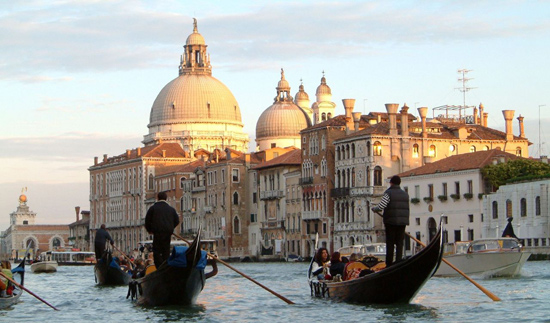
What’s in a Renaissance-era derived international brand name?
So what of Chinese gambling, real and fake Italian Renaissance art, and its impact on the big league stakes of gaming? Purely by chance, the happy co-incidence of international conference attendance and one Grand Prix, I’ve been able to visit over the past six weeks three Venices. The real one in Italy, from where Marco Polo set off to discover the East, the Venetian Casino in Las Vegas, and its upstart offspring in Macau.
Macau, the tiny old Portuguese enclave, returned to China in 1999 after 500 years (the Brits had Hong Kong, by comparison, for just 150) is about to achieve a massive explosion of world ranking concerning income generation. This will add huge revenues to China’s coffers, and make a deep impression in terms of its new found financial muscle. It is about to become the wealthiest territory in terms of revenue generated per square mile than anywhere else on earth.
Certainly its days as a sleepy backwater to Hong Kong’s steel and glass-clad canyons of wealth, the destination of quaint, romantic weekends and plates of grilled sardines at Fernando’s are over. Not any more, one can fly into Macau these days, and its own international airline touches down a mere 20 minutes free shuttle bus journey from the nearest casino. As for the Venetian Macao, it now boasts the world’s largest gaming area – over one million square feet.
Meanwhile, the Venetian Macao’s gondolas ride up and down the small canals, under a roof where the skies are blue and the haze of clouds can be seen. Yet it’s all an illusion amidst the variety of shops – everything from a Manchester Unitedstore to Tiffany’s to McDonalds – the sky is painted on. And horror of horrors, the masculine world of the gondolier has given way to women – never in Venice. It feels like Disney. It’s an appropriate mixture – in China and the U.S., even city landscapes can be faked.
Macau though, has something that cannot be faked and even Las Vegas doesn’t possess – a Grand Prix. One of only two street circuits in professional racing – the other being Monaco (another gambling city) – Macau has thrilled for over 50 years to cars racing around its twisted circuit. As the testing ground for what goes on in the larger F1 cars, the Formula Three machines that race through Macau’s streets now reach speeds at over 270 kph. Past winners of the Grand Prix have included Aryton Senna, Michael and Ralf Schumacher, Jorg Muller, David Coulthard and many other F1 luminaries. It’s Macau’s biggest event and adds speed and glamour that not even the casinos can deliver.
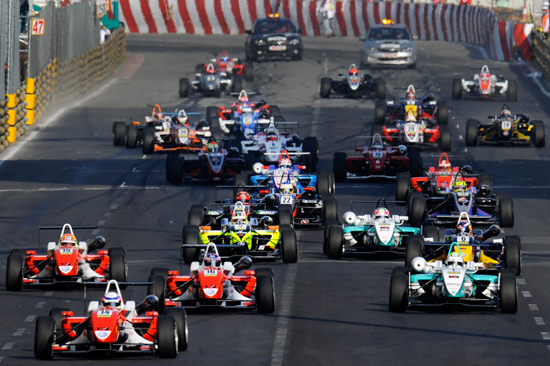
But back to gambling…What’s actually in an international brand name? Taking “Venice” and “The Venetian” as starting points, here we provide as much comparative data as we’ve been able to find, and look at Venice as a city, as well as its gambling namesake resort hotels in Las Vegas and Macau, and then compare the three.
Numbers of hotel rooms:
Venice, Italy: 13,067
The Venetian, Las Vegas: 4,027
The Venetian Macao: 3,000
By just putting the two Venetian brand resorts together, you reach just over half the total occupancy of an entire Renaissance Italian city – itself no slouch on the international tourist trails. That’s staggering.
Indeed, going further and counting the total numbers of hotel rooms in Las Vegas (130,000) and Macau (13,000), when you put together the two gaming resorts, and bearing in mind the Macau figure is set to dramatically increase further as more developments open, Las Vegas and Macau beat out Venice with ten times more hotel rooms.
To put that into further context, it must added that Las Vegas’ residential population runs at 590,000 souls; and Macau at 456,000, compared to just 63,000 resident in Venice. Indeed, in Venice’s case, the resident population is shrinking as you can’t get cars into the city center (all those canals) and daytime tourism makes it busy and less attractive to live as a local. Macau’s however is set to increase still further – and it’s interesting to note, for such a small territory, its population size is larger than that of Las Vegas. Labor shortages are an issue in Macau and the SAR government is about to make changes to its employment law and working visa criteria to ease this problem.
But Las Vegas is fighting back. In what is now a two horse race between gambling giants, the Venetian Palazzo Resort is about to open (soft opening December 20 this year), making the combined Venetian-Palazzo resort the world’s largest hotel complex at a whopping 7074 rooms. Macau meanwhile, is about to open the MGM Grand later this month, a joint venture between MGM and Pansy Ho, the daughter of Macau’s gambling Godfather, Stanley Ho. These figures are just going to keep on climbing.
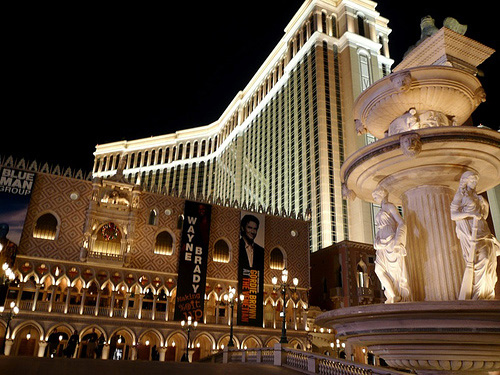
Numbers of annual visitors:
Venice, Italy: 16 million
Las Vegas: 40 million
Macau: 22 million
The numbers compared to the hotel beds make interesting reading, although we suspect Macau’s evolution will change them further. Venice, for 16 million visitors, has the largest number of hotel beds. Yet Las Vegas and Macau lag behind. Why? One issue is the length of time someone stays in the location – Macau and Las Vegas are short term gambling trips, designed to part you with as much money as possible in the shortest possible time. The room rate turnover will be higher, and they do not need the same quantity of rooms. Venice however does not offer gambling, catering for romantic weeks or fortnights, it consistently needs to provide for its visitors staying for longer.
We can also compare the Venice/Venetian brand. As we have seen, the city of Venice attracted 16 million visitors in 2006. However, when we look at the Venetian Las Vegas, again, purely the resort hotel and casino, they averaged 50,000 a day during 2006 – a total of about 18 million visits during the year – more than Venice in its entirety.
Yet even that pales to what is now happening in Macau. In the first eight weeks of opening earlier this year, The Venetian Macao attracted a mind-boggling 3.9 million guests, a rate that, if maintained consistently over 12 months (most of that during 2008), would give it 23.4 million visitors per annum – just for the hotel resort. It’s likely however that many of those during that initial period were just there for the initial thrill of attending a new casino and may not return. But even so, that figure equals the entire projected number of visitors to Macau during 2007 – a sign that for Macau, the Venetian is very big business indeed and a massive draw of income to the territory, something that will surely be seen in its full impact at the end of 2008.
That impact is already making itself apparent – in a sheer tsunami of arrivals – 114,000 visited in the 24 hours of operation alone. At this rate Macau’s Venetian is going to shatter all previous casino visiting and revenue records, and the figures for the full year end 2008 will be fascinating reading.
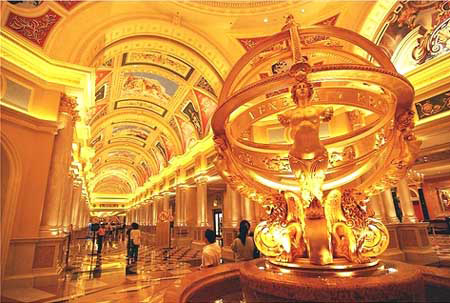
Cost of a two-person gondola ride:
Venice, Italy: US$150
Venetian, Las Vegas: US$60
Venetian Macao: US$30
It’s a fun to compare this along several lines. Actually, a gondola ride in Venice is the real deal, and luxury or original goods cost more. There’s 2,000 years of R&D investment in that ride, and those costs, as well as the more expensive European labor, are passed onto the consumer. A Venice, Italy gondola ride is the high-end equivalent of a Prada handbag…truly top end. Las Vegas however, while still expensive in terms of labor, doesn’t have the cachet of Europe, and rates are mid-level. The Levi Strauss of gondola rides is just US$60, nearly a third of the price in Venice. Tellingly, taking a gondola in Macau is the cheapest at US$30, however we note the cheap Chinese labor aspect doesn’t come into the equation – the gondoliers are imported Italians. Consequently, its market forces driving the prices in Macau down: attract mainland Chinese to participate, have a good time, and spend more money on the tables. Still, as low as those prices are, it’s still a fake, and Macau’s Gondoliers – some of whom are women, unheard of in Venice – and the prices they charge rank below Venice and Las Vegas to reach the “counterfeit goods level” of consumer economics. Or, in another way of looking at it, a loss leader to allow Chinese tourists a photo opportunity to spread the word back home, creating a cache of wanting to visit amongst their friends.
Money: Let’s talk about winning some cash!
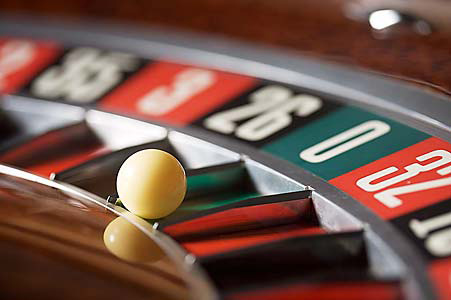
Here we’ll compare three sets of GDP figures, between Venice, the Venetian Las Vegas and the Venetian Macao, between the three cities in total, and then examine how this impacts on annual income for those who live in the three cities.
Gross GDP 2006:
Venice, Italy: US$168 million
Venetian, Las Vegas: US$373 million
Venetian Macao: n/a
The Venetian Macao statistics are not available as the resort only opened three months ago. These can however be approximated as a general comparison by the first month’s turnover, which reached a whopping US$150 million – half of the annual turnover of the Venetian, Las Vegas in one month! If multiplied by 12 this would give an approximate 2007 GDP for the Venetian Macao at US$1.8 billion dollars. While it may not be a sustainable figure due to the novelty of visiting the casino when it opened, for sure the Venetian Macao is seriously outstripping its Las Vegas counterpart in turnover.
Gambling therefore is big business, huge. Just the Las Vegas Venetian hotel resort generates double the revenues of the entire city of Venice, and the Venetian Macao looks set to surpass even that figure.
If we compare these at a city level, the statistics show the following:
Gross GDP 2006:
Venice, Italy: US$168 million
Las Vegas: US$80.5 billion
Macau: US$10 billion
Las Vegas rules the roost here in terms of income, but Macau is expected to show a huge jump for 2007 figures with a significant increase in gaming revenues not yet showing up. Neither the Sands nor the Venetian in Macau affect the 2006 figures. As for Venice, it’s far, far behind. Maybe the city mayor should charge royalties for the use of such Venetian specific symbols as St. Marks Square, the Palazzo, gondoliers and the city’s own symbol of a winged lion. Where are the Venetian copyright lawyers?
Gross GDP per capita, 2006:
Venice, Italy: US$39, 727
Las Vegas: US$53,111
Macau: US$24,300
Telling figures, despite all the revenues, the gambling income goes to Government, and not to the local residents! In terms of quality of life, Venice would be hard to beat, while Las Vegas interesting. Macau, with the lowest per capita income reflects both it’s proximity to the cheaper labor pools in mainland China, and its previous life as a sleepy backwater.
Who is top dog?
In the three city tour, and financial comparisons, there is one clear winner, and a very clear last place.
Macau, in second place, turned over nearly 60 times the revenues generated by the city of Venice in 2006, a disparity in income that is likely to widen.
Las Vegas, the winner, turned over eight times the revenues generated by Macau in 2006, a disparity that is likely to narrow while revenues from both are likely to increase.
Finally though, the real test of being Venetian is to ask for a Limoncello at the Café Florian.
In Venice, the Florian remains the countries oldest café, being in business since 1720 and sited right on San Marco Square. Limoncello is the preferred Italian liquor. However, my request at the Café Florian in Macau’s Venetian was met with dumbfounded looks and a gesture at a rather tawdry menu. No Limoncello, just the usual cocktails and spirits, nothing to get excited about.
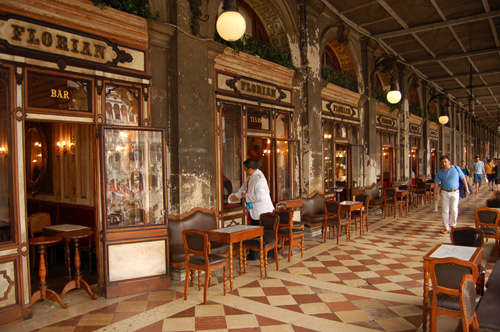
While the Venetian gambling brand may have borrowed from Venice’s unique style, despite all the cash and the glitz it just cannot match up to the real thing, and there remains, thankfully only one real Venice. It’s sited in Italy. But as revenue generators, the Venetian Las Vegas and Macau are in a different league, and their cities on a totally different planet. Now, where’s my gondola…
Chris Devonshire-Ellis is the founding partner of Dezan Shira & Associates and is married to an Italian. He regularly visits Venice, speaks annually at China conferences in Las Vegas and has attended the Macau Grand Prix every year since 1993.
*Editor’s Note (May 11, 2012): Since this article was published five years ago, Macau’s gambling (not total) revenues have gone on to reach five times that spent in Las Vegas in 2011 and have reached US$32.5 billion.
- Previous Article It was 30 years ago today…
- Next Article The regrettable rise of the ill-informed China journalists













